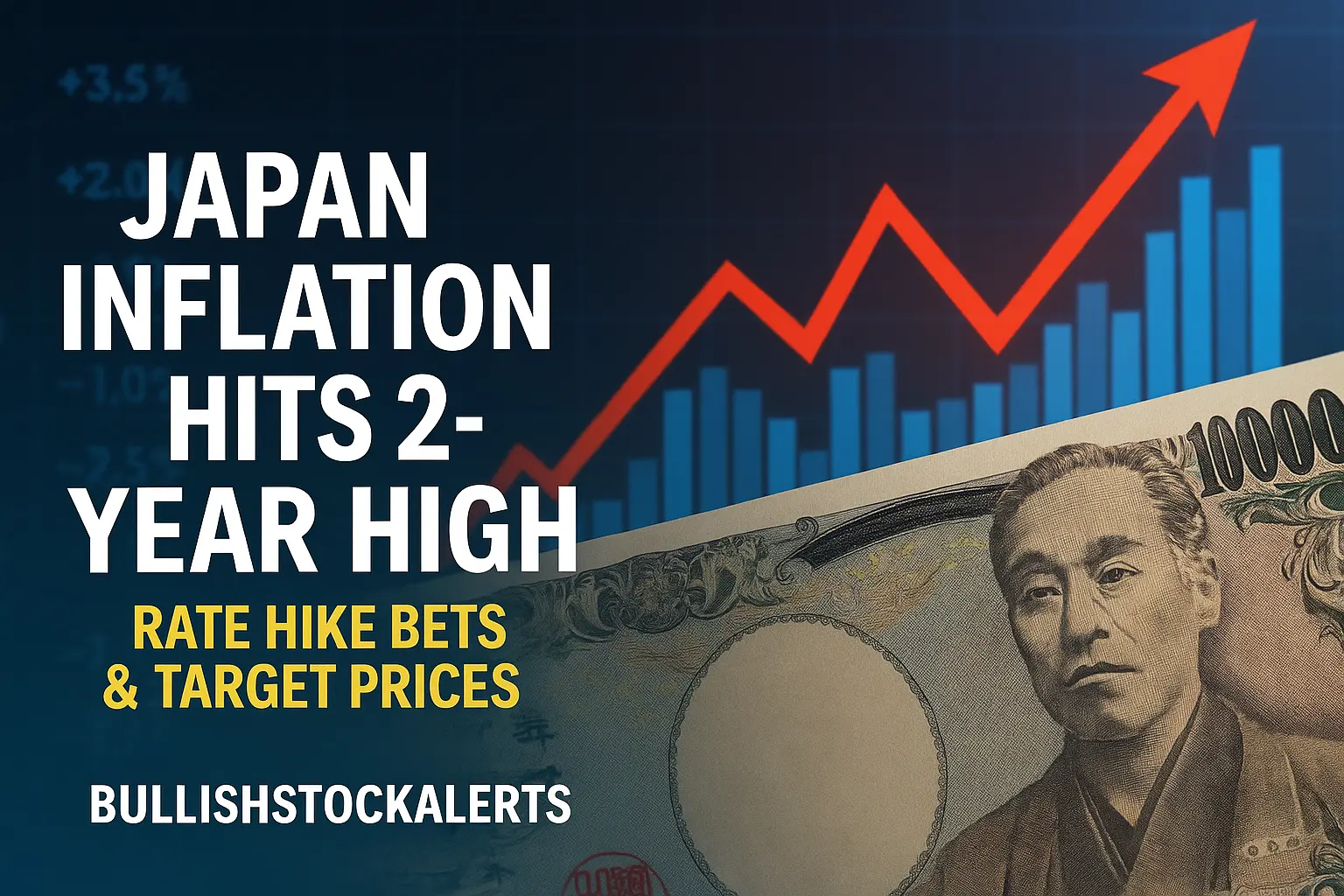Introduction
Japan’s core inflation surged to a two-year high in May 2025, surpassing expectations and raising the likelihood of continued rate hikes by the Bank of Japan (BOJ). The data highlights persistent inflationary pressures, especially in food prices, which could have long-lasting effects on Japan’s economy and financial markets. In this article, we will analyze how the inflationary trend and rate-hike outlook could affect the broader market and present investment opportunities, including target price predictions and strategies for navigating this volatile environment.
One of the Best Brokers in Europe
As global inflation concerns rise, having the right broker is crucial for investors seeking to navigate the markets effectively. This broker is one of the top choices in Europe, providing robust tools, low fees, and access to both global and Japanese markets. Investors looking to capitalize on the current economic conditions in Japan and beyond will find excellent opportunities with this broker.
Financial Performance
Despite inflationary pressures, Japan’s economy has demonstrated resilience. The core consumer price index (CPI) rose by 3.7% in May, driven by persistent food inflation. The impact on consumer behavior and overall spending is something investors should consider when evaluating the performance of Japan-focused companies and other sectors affected by inflationary pressures.
Key Highlights
- Inflationary concerns: Japan’s core inflation hits 3.7%, marking the highest level in two years.
- Rate hike expectations: The BOJ is expected to continue gradual rate hikes.
- Market Impact: The rising inflation puts pressure on consumer spending, making it critical to monitor how sectors will respond.
Profitability and Valuation
Japan’s economic situation presents both challenges and opportunities. Companies that are heavily impacted by rising food and energy prices may face squeezed margins, while others that can pass on these costs to consumers could maintain or even improve profitability. The valuation of stocks in inflation-sensitive sectors will be crucial in the coming months, as investors adjust their expectations based on inflation trends.
Debt and Leverage
The Japanese economy is already grappling with high levels of debt, and rising inflation could exacerbate these concerns. Companies with high leverage may struggle to maintain profitability if interest rates continue to rise. Conversely, firms with strong balance sheets and minimal debt exposure could present better investment opportunities in the current economic climate.
Growth Prospects
While inflation poses risks to Japan’s growth, the country’s strong industrial base and technological advancements provide significant opportunities for long-term growth. Companies that operate in sectors less impacted by inflationary pressures, such as technology and automation, are well-positioned to thrive.
Technical Analysis
The technical outlook for Japan’s equity markets, as well as global indices, reflects investor concern about the impact of rising inflation and potential rate hikes. Key technical indicators suggest a cautious approach to investing in inflation-sensitive sectors. However, sectors like technology, which are less sensitive to inflation, show strong bullish patterns.
Potential Catalysts
Several factors could drive growth despite inflationary pressures:
- Government policy: Potential stimulus measures or economic reforms to counter inflation.
- Technological innovation: Continued advancements in automation and digital transformation.
- Global demand: Increased demand for Japanese exports, particularly in technology and manufacturing.
Leadership and Strategic Direction
The leadership in Japan’s central bank, particularly BOJ Governor Kazuo Ueda, remains focused on carefully managing inflation while addressing the risks posed by rising costs. Their gradual approach to rate hikes is designed to avoid an economic slowdown, but external factors such as U.S. tariffs and global trade tensions will complicate their decision-making.
Impact of Macroeconomic Factors
Inflation is not the only challenge facing Japan. The ongoing U.S.-China trade tensions, combined with the effects of rising tariffs, create an unpredictable global trade environment. Japan’s dependency on exports means that global economic conditions, particularly in the U.S. and China, will continue to impact the market.
Total Addressable Market (TAM)
Despite inflationary challenges, Japan’s total addressable market remains vast, particularly in the tech sector. The global demand for Japan’s high-tech products, such as robotics and automotive parts, provides significant growth opportunities for companies in these industries. Investors should look for companies well-positioned to capitalize on Japan’s strengths in these fields.
Market Sentiment and Engagement
Investor sentiment in Japan is mixed, with concerns about inflation counterbalanced by optimism in sectors like technology. Market sentiment will likely remain volatile, but stocks in growth sectors that are less sensitive to inflation will continue to see positive sentiment.
Conclusions, Target Price Objectives, and Stop Losses
Based on the current economic outlook, here are the target price objectives:
- Short-term Target (3 months): $120.00 (with potential 8% upside)
- Mid-term Target (6 months): $130.00 (with potential 15% upside)
- Long-term Target (12+ months): $150.00 (with potential 25% upside)
Stop Loss Recommendations:
- Short-term: $110.00
- Mid-term: $105.00
- Long-term: $100.00
These targets provide a balanced risk-reward strategy, allowing investors to capitalize on potential growth while protecting against downside risk.
Discover More
For more insights into analyzing value and growth stocks poised for sustainable growth, consider this expert guide. It provides valuable strategies for identifying high-potential value and growth stocks.
We also have other highly attractive stocks in our portfolios. To explore these opportunities, visit our investment portfolios.
This analysis serves as information only and should not be interpreted as investment advice. Conduct your own research or consult with a financial advisor before making investment decisions.
Looking to Educate Yourself for More Investment Strategies?
Check out our free articles where we share our top investment strategies. They are worth their weight in gold!
📖 Read them on our blog: Investment Blog
For deeper insights into ETF investing, trading, and market strategies, explore these expert guides:
📘 ETF Investing: ETFs and Financial Serenity
📘 Technical Trading: The Art of Technical & Algorithmic Trading
📘 Stock Market Investing: Unearthing Gems in the Stock Market
📘 Biotech Stocks (High Risk, High Reward): Biotech Boom
📘 Crypto Investing & Trading: Cryptocurrency & Blockchain Revolution









0 Comments